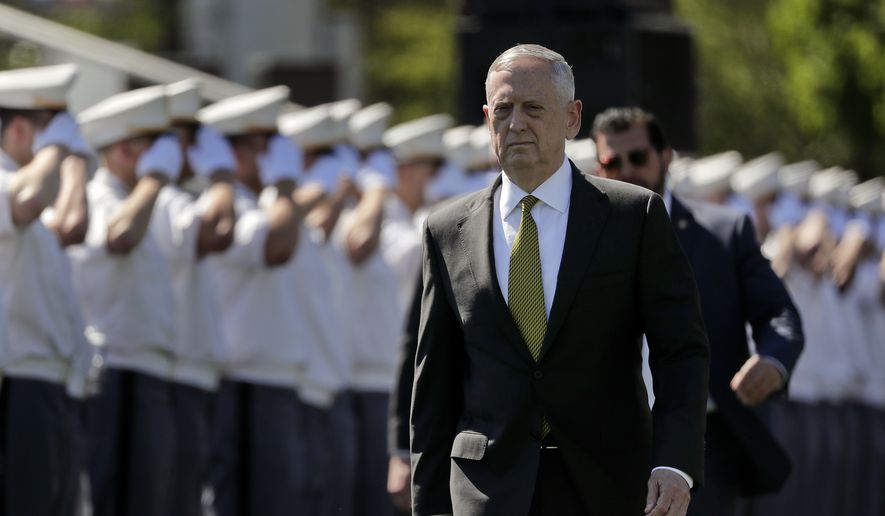The U.S. and its allies are facing a new “era” in global conflict defined by protracted, small wars with extremist militant groups, Defense Secretary James Mattis said Sunday.
With the Islamic State is on the verge of territorial defeat in Iraq and Syria, smaller terror cells can be expected to big up group’s ideological banners and continue the fight in “frequent skirmishes” with the U.S. and Western forces, Mr. Mattis said during an interview on CBS’ “Face the Nation.”
“This is going to be a long fight … We will do it by with, and through other nations. We will do it through developing their capabilities to do a lot of the fighting. We will help them with intelligence. Certainly, we can help train them for what they face,” Mr. Mattis said.
“You see our forces engaged in that from Africa to Asia. But, at the same time, this is going to be a long fight. And I don’t put timelines on fights,” the former U.S. Central Command chief added.
As U.S.-led coalition forces prepare for the final assault on Raqqa — the group’s self-styled capital — experts say ISIS is poised to go underground, with assistance from al Qaeda which could mark a return to the savage terrorist tactics that made the group infamous during the Iraq War.
“We have had success on the battlefield. We have freed millions of people from being under their control. And not one inch of that ground that ISIS has lost has ISIS regained. It shows the effectiveness of what we are doing,” Mr. Mattis said Sunday.
“However, there are larger currents, there are larger confrontations … and we cannot be blind to those,” he added, when asked what U.S. strategy would be in a post-ISIS world.
President Trump has already ordered an acceleration of American-led operations to dismantle and destroy the al Qaeda-affiliated Somali-based terror network, al-Shabab. The death of Senior Chief Special Warfare Operator Kyle Milliken, killed during a Somali-led raid on an al-Shabab stronghold earlier this month, was the first U.S. casualty in Somalia since 18 American soldiers were killed during the infamous “Black Hawk Down” incident in 1993.
U.S. commanders in the Pacific are also bracing against an uptick in violence by ISIS-affliated extremists groups in the region.
Mr. Mattis’ comments come just as Philippine forces, backed by Washington, are battling ISIS fighters in the southern part of the country. Members of the Islamic State cell in the Philippines overran the city of Marawi, provincial capital of Mindanao’s Lanao del Sur in the southern Philippines late last week.
Islamic State on Wednesday claimed responsibility for a dual suicide bombing in Jakarta, which killed three police officers and injured 12 people.
Last week, 22-year old Salman Abedi killed 22 people and injured hundreds more when he launched a suicide attack during a pop concert in the British city of Manchester. The attack, for which Islamic State also claimed credit, was the worst terrorist attack to hit the United Kingdom since the infamous “7/7” attacks in central London, more than a decade ago.
Islamic State has already begun advocating that recruits and sympathizers make their way into Asia and Western Europe to launch terror attacks, instead of attempting to make their way into Iraq or Syria. U.S. and western national security and intelligence agencies are also trying to manage the threat posed by ISIS foreign fighters, returning home from the Middle East and looking to continue the fight on their home soil.
• Carlo Muñoz can be reached at cmunoz@washingtontimes.com.




Please read our comment policy before commenting.